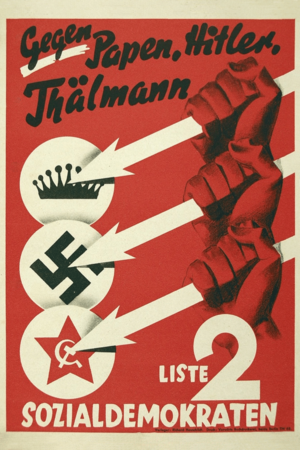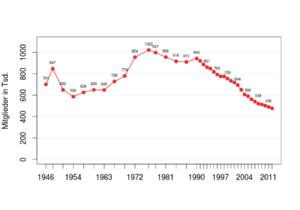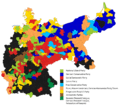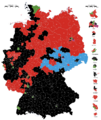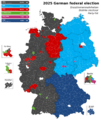Social Democratic Party of Germany facts for kids
Quick facts for kids <div style="padding-top:0.3em; padding-bottom:0.3em; border-top:2px solid Lua error in Module:European_and_national_party_data/config at line 227: attempt to index field 'data' (a nil value).; border-bottom:2px solid Lua error in Module:European_and_national_party_data/config at line 227: attempt to index field 'data' (a nil value).; line-height: 1;">
Social Democratic Party of Germany
Sozialdemokratische Partei Deutschlands
|
|
|---|---|
| Abbreviation | SPD |
| General Secretary | Tim Klüssendorf |
| Co-leaders |
|
| Deputy Leaders |
See list
Petra Köpping
Serpil Midyatli Achim Post Anke Rehlinger Alexander Schweitzer |
| Founded | 27 May 1875 |
| Merger of |
|
| Headquarters | Willy-Brandt-Haus D-10911 Berlin |
| Newspaper | Vorwärts |
| Think tank | Friedrich Ebert Foundation |
| Student wing | Juso-Hochschulgruppen |
| Youth wing | Young Socialists in the SPD |
| Women's wing | Association of Social Democratic Women |
| LGBT+ wing | SPDqueer |
| Paramilitary wing | Reichsbanner Schwarz-Rot-Gold (1924–33) |
| Membership (2024) | |
| Ideology | Social democracy |
| Political position | Centre-left |
| European affiliation | Party of European Socialists |
| International affiliation | Progressive Alliance Socialist International (1951–2017) |
| European Parliament group | Progressive Alliance of Socialists and Democrats |
| Colours | Red |
| Bundestag | Lua error in Module:European_and_national_party_data/config at line 227: attempt to index field 'data' (a nil value). |
| State parliaments |
453 / 1,894
|
| European Parliament | Lua error in Module:European_and_national_party_data/config at line 227: attempt to index field 'data' (a nil value). |
| Heads of State Governments |
7 / 16
|
| Party flag | |
 |
|
| Website | |
| Lua error in Module:European_and_national_party_data/config at line 227: attempt to index field 'data' (a nil value). | |
The Social Democratic Party of Germany (SPD) is a major political party in Germany. It believes in social democracy, which means it works for a fair and equal society.
Lars Klingbeil has been a co-leader of the party since 2021, and Bärbel Bas joined him as co-leader in June 2025. After the 2025 German federal election, the SPD became a junior partner in the German government, working with the CDU/CSU party. The SPD is also part of many state governments across Germany.
Contents
History of the SPD Party
The SPD was formed in 1875 when smaller socialist groups joined together. It grew quickly, becoming the largest socialist party in Western Europe by 1933.
Early Years and Growth
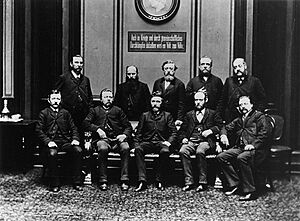
The SPD started from groups like the General German Workers' Association (1863) and the Social Democratic Workers' Party (1869). These groups merged in 1875 to form the Socialist Workers' Party of Germany. Even though laws tried to stop socialist ideas from spreading between 1878 and 1890, the party still gained support. In 1890, when the ban was lifted, the party took its current name, the Social Democratic Party of Germany.
Before World War I, the SPD was a strong voice for workers' rights. In the 1912 German federal election, the SPD won the most votes and became the largest party in the Reichstag, which was like Germany's parliament back then.
World War I and the Weimar Republic
When World War I started in 1914, the SPD supported Germany's war efforts. This caused a split within the party, as some members disagreed with the war. Those who opposed the war formed a new group.
The SPD played a big part in the German Revolution of 1918–1919. On November 9, 1918, Friedrich Ebert, a leading SPD member, became chancellor. Germany was then declared a republic. The SPD government quickly introduced many reforms, giving people more civil liberties and labor rights. Friedrich Ebert later became the first president of Germany in 1919. The SPD was the largest party during the first 13 years of the new Weimar Republic.
Facing the Nazis and Post-War Rebirth
When the Nazi Party came to power, the SPD was the only party in the Reichstag to vote against the Enabling Act of 1933. This act gave Adolf Hitler special powers. After this, the SPD was banned, and many of its members were arrested or had to flee the country. The party continued to operate in exile.
After World War II ended in 1945, the SPD was re-established in West Germany. In East Germany, it was forced to merge with the Communist Party. In West Germany, the SPD became one of the two main political parties. In 1959, the SPD changed its program to appeal to a wider range of voters, becoming a more central party.
Leading Germany and Recent Times
The SPD has led the German government several times:
- From 1969 to 1982, under Willy Brandt and Helmut Schmidt. Willy Brandt worked to improve relations with East Germany and other Eastern European countries.
- From 1998 to 2005, under Gerhard Schröder.
- From 2021 to 2025, under Olaf Scholz.
The SPD has also been a junior partner in governments led by other parties. In 1990, the East German SPD joined with the West German party just before Germany was reunified.
In the 2024 European Parliament election in Germany, the SPD came in third place. In December 2024, the government coalition led by Olaf Scholz ended. The SPD then entered the 2025 German federal election and became the third-largest party.
What the SPD Believes In
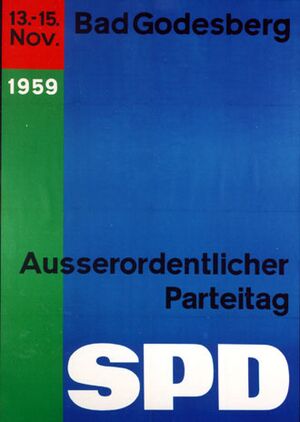
The SPD believes in democratic socialism, which means they want a society where everyone has freedom and social justice. They aim for a society where people can live without being exploited or oppressed.
Here are some of their main ideas:
- Economy: They support a social market economy that helps everyone. They believe the economy should be strong and its benefits shared fairly among all people.
- Welfare State: The SPD supports a strong welfare state, which means the government helps people with things like healthcare, education, and unemployment benefits.
- Finances: They believe in careful spending by the government, trying to avoid too much debt.
- Social Issues: The SPD supports civil and political rights for everyone in an open society.
- Foreign Policy: They want to ensure global peace and believe in European integration, meaning countries in Europe should work closely together. During Olaf Scholz's time as chancellor, the party also focused on a new German defense policy.
- Economic Rules: The SPD supports rules for the economy to protect banks and people from big financial losses. They also want a common European economic policy to help the environment and prevent financial problems.
Different Views Within the Party
The SPD has different groups within it. Some members, called "Keynesian social democrats," believe in more government spending to help the economy. Others, known as "Third Way" or "moderate social democrats," support more market-friendly policies. These groups sometimes have different ideas about how much the government should be involved in the economy and social programs.
Where the SPD Gets Its Support
The SPD gets a lot of support from large cities, especially in northern and western Germany, and in Berlin. Many of Germany's biggest cities have SPD mayors. The Ruhr Area, which used to be a big industrial region, has been a strong base for the SPD for a long time. The city of Bremen has been governed by the SPD since 1949.
In southern Germany, the SPD usually has less support, except in the very largest cities. However, in the 2021 German federal election, the party gained more votes in the states that were once part of East Germany.
Important Leaders of the SPD
The SPD has a federal leader, who is supported by six Deputy Leaders and a party executive committee. As of 2025, the co-leaders are Bärbel Bas and Lars Klingbeil. Each German state also has its own SPD party.
Party Leaders
| Leader | Year | |
|---|---|---|
| 1 | Kurt Schumacher | 1946–1952 |
| 2 | Erich Ollenhauer | 1952–1963 |
| 3 | Willy Brandt | 1964–1987 |
| 4 | Hans-Jochen Vogel | 1987–1991 |
| 5 | Björn Engholm | 1991–1993 |
| 6 | Rudolf Scharping | 1993–1995 |
| 7 | Oskar Lafontaine | 1995–1999 |
| 8 | Gerhard Schröder | 1999–2004 |
| 9 | Franz Müntefering (1st term) | 2004–2005 |
| 10 | Matthias Platzeck | 2005–2006 |
| 11 | Kurt Beck | 2006–2008 |
| 12 (9) |
Franz Müntefering (2nd term) | 2008–2009 |
| 13 | Sigmar Gabriel | 2009–2017 |
| 14 | Martin Schulz | 2017–2018 |
| 15 | Andrea Nahles | 2018–2019 |
| 16 | Saskia Esken & Norbert Walter-Borjans |
2019–2021 |
| 17 | Saskia Esken & Lars Klingbeil | 2021–2025 |
| 18 | Bärbel Bas & Lars Klingbeil | 2025–present |
Leaders in the Bundestag
| Leader | Year | |
|---|---|---|
| 1 | Kurt Schumacher | 1949–1952 |
| 2 | Erich Ollenhauer | 1952–1963 |
| 3 | Fritz Erler | 1964–1967 |
| 4 | Helmut Schmidt | 1967–1969 |
| 5 | Herbert Wehner | 1969–1983 |
| 6 | Hans-Jochen Vogel | 1983–1991 |
| 7 | Hans-Ulrich Klose | 1991–1994 |
| 8 | Rudolf Scharping | 1994–1998 |
| 9 | Peter Struck (1st term) | 1998–2002 |
| 10 | Ludwig Stiegler | 2002 |
| 11 | Franz Müntefering | 2002–2005 |
| (9) | Peter Struck (2nd term) | 2005–2009 |
| 12 | Frank-Walter Steinmeier | 2009–2013 |
| 13 | Thomas Oppermann | 2013–2017 |
| 14 | Andrea Nahles | 2017–2019 |
| 15 | Rolf Mützenich | 2019–2025 |
| 16 | Lars Klingbeil | 2025 |
| 17 | Matthias Miersch | 2025-present |
Federal Presidents
| Gustav Heinemann | 1969–1974 |
| Johannes Rau | 1999–2004 |
| Frank-Walter Steinmeier | 2017–present |
Federal Chancellors
| Chancellor of Germany | Time in office |
|---|---|
| Willy Brandt | 1969–1974 |
| Helmut Schmidt | 1974–1982 |
| Gerhard Schröder | 1998–2005 |
| Olaf Scholz | 2021–2025 |
Vice Chancellors
| Vice Chancellor of Germany | Time in office |
|---|---|
| Willy Brandt | 1966–1969 |
| Egon Franke | 1982 |
| Franz Müntefering | 2005–2007 |
| Frank-Walter Steinmeier | 2007–2009 |
| Sigmar Gabriel | 2013–2018 |
| Olaf Scholz | 2018–2021 |
| Lars Klingbeil | 2025-present |
State-Level Leaders
| State | Leader | Seats | Government |
|---|---|---|---|
| Baden-Württemberg | Andreas Stoch |
19 / 154
|
Opposition |
| Bavaria | Ronja Endres |
17 / 203
|
Opposition |
| Berlin | Franziska Giffey & Raed Saleh |
34 / 147
|
CDU–SPD |
| Brandenburg | Dietmar Woidke |
32 / 88
|
SPD–BSW |
| Bremen | Falk-Constantin Wagner |
27 / 87
|
SPD–Greens–Left |
| Hamburg | Melanie Leonhard |
53 / 123
|
SPD–Greens |
| Hesse | Sören Bartol |
23 / 133
|
CDU–SPD |
| Lower Saxony | Stephan Weil |
57 / 146
|
SPD–Greens |
| Mecklenburg-Vorpommern | Manuela Schwesig |
34 / 79
|
SPD–Left |
| North Rhine-Westphalia | Thomas Kutschaty |
56 / 195
|
Opposition |
| Rhineland-Palatinate | Roger Lewentz |
39 / 101
|
SPD–Greens–FDP |
| Saarland | Anke Rehlinger |
29 / 51
|
Majority |
| Saxony | Kathrin Michel & Henning Homann |
10 / 120
|
CDU–SPD |
| Saxony-Anhalt | Juliane Kleemann & Andreas Schmidt |
9 / 97
|
CDU–SPD–FDP |
| Schleswig-Holstein | Serpil Midyatli |
12 / 69
|
Opposition |
| Thuringia | Georg Maier |
6 / 88
|
SPD–BSW–CDU |
Images for kids
See also
 In Spanish: Partido Socialdemócrata de Alemania para niños
In Spanish: Partido Socialdemócrata de Alemania para niños
- Bundestag (Federal Assembly of Germany)
- List of political parties in Germany
- Politics of Germany
- Weimar Republic
 | Misty Copeland |
 | Raven Wilkinson |
 | Debra Austin |
 | Aesha Ash |


